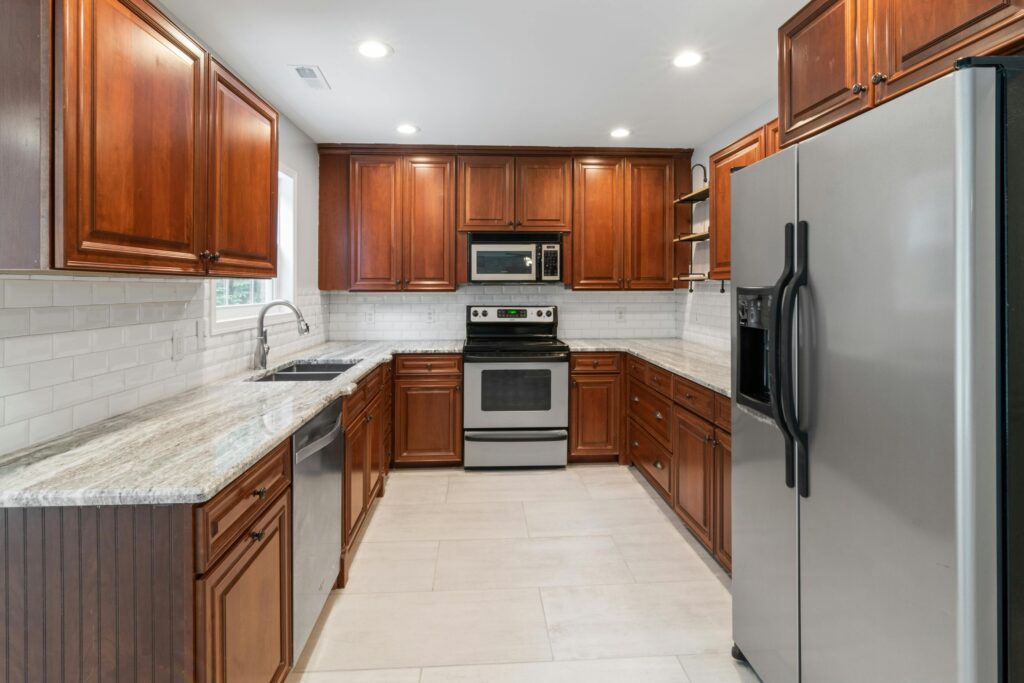Introduction
- Defining Kitchen Remodel and Kitchen Renovation
- Key Differences Between Kitchen Remodel and Renovation
- Deciding Between a Remodel and a Renovation
- Popular Trends in Kitchen Remodels and Renovations
- Tips for Planning Your Kitchen Project
- Common Mistakes to Avoid in Kitchen Projects
- Kitchen Remodel vs. Renovation: Which One Is Right for You
- Conclusion
- FAQs
When planning to upgrade your kitchen, the terms “kitchen remodel vs. renovation”Deciding between “remodel” and “renovation” can be challenging as you determine which option aligns best with your specific goals and requirements. A “remodel vs. renovation” decision depends on the scope, cost, and desired outcome of your project. Remodels typically involve significant structural changes, while renovations focus on updating existing features. Understanding the difference between the two is essential for planning a successful project, whether you want a complete transformation or a quick aesthetic upgrade. This guide will explore the key differences, helping you make an informed decision that aligns with your goals and budget.
Defining Kitchen Remodel and Kitchen Renovation
What Is a Kitchen Remodel?
A kitchen remodel involves significant changes to the structure, layout, or functionality of the space. This type of project often includes:
- Relocating or removing walls.
- Changing the placement of appliances or plumbing.
- Adding features like an island or pantry.
A remodel transforms the kitchen into a new space, catering to updated needs or design preferences. It’s ideal for homeowners seeking a complete overhaul or addressing outdated layouts.
What Is a Kitchen Renovation?
In contrast, a kitchen renovation focuses on restoring or updating existing features. Instead of altering the structure, renovations enhance what’s already there. Common renovation projects include:
- Repainting cabinets for a fresh look.
- Upgrading countertops or backsplashes.
- Replacing worn flooring.
Renovations are perfect for refreshing a kitchen without major construction or expense.
Key Differences Between Kitchen Remodel and Renovation
Scope of Work
- Remodel: Involves structural and functional changes. Examples include expanding the kitchen, moving plumbing lines, or reconfiguring the layout.
- Renovation: Focuses on restoring or updating existing elements. Examples include refinishing cabinets or upgrading fixtures.
Costs and Budget Considerations
Kitchen remodels generally cost more than renovations due to their complexity. Factors influencing remodel costs include:
- Hiring contractors for plumbing and electrical work.
- Purchasing new cabinetry, appliances, and materials.
Renovations, on the other hand, are often more budget-friendly. They focus on cosmetic improvements like paint or new hardware, which are less labor-intensive.
Timeframe and Project Duration
Because remodels require structural changes, they take longer to complete. A typical remodel can last several months, while renovations are usually finished in a few weeks, depending on the project size.
Deciding Between a Remodel and a Renovation
Assessing Your Needs and Goals
Start by evaluating your kitchen’s current condition and identifying what you want to achieve.
- Remodel if: The layout is inefficient, or the space lacks functionality.
- Renovate if: The structure is sound, but the aesthetics need a refresh.
Budget Constraints
Finances often dictate whether a remodel or renovation is feasible.
- Remodeling projects may require loans or extensive savings due to their cost.
- Renovations allow for cost-effective updates, often completed in stages.
Property Value and ROI
Both remodels and renovations can add value to your home, but the extent depends on the market and the quality of the work.
- Remodels often yield higher returns, especially when updating outdated layouts.
- Renovations are a quick way to boost curb appeal and marketability.
Popular Trends in Kitchen Remodels and Renovations
Trending Remodel Ideas
- Open-concept kitchens: Opening up spaces by removing walls creates an open and airy atmosphere.
- Smart kitchens: Installing modern appliances and home automation features.
- Contemporary layouts: Adding sleek, minimalistic designs.
Trending Renovation Ideas
- Cabinet makeovers: Repainting or refinishing instead of replacing.
- Backsplash upgrades: Adding patterns or textured tiles.
- Eco-friendly updates: Using sustainable materials like bamboo or recycled glass.
Tips for Planning Your Kitchen Project
Hiring Professionals vs. DIY
- Professional remodels: Best for complex structural changes or high-end projects.
- DIY renovations: Suitable for tasks like painting or replacing cabinet hardware.
Creating a Realistic Timeline
- Account for potential delays due to materials or labor shortages.
- Coordinate with contractors to avoid prolonged disruptions.
Sourcing Materials and Fixtures
- Research suppliers for affordable, high-quality materials.
- Opt for timeless designs that enhance resale value.
Common Mistakes to Avoid in Kitchen Projects
- Overextending the budget: Always leave room for unexpected costs.
- Ignoring functionality for aesthetics: Prioritize a practical layout.
- Choosing the wrong contractor or DIY approach: Ensure expertise aligns with project needs.
Kitchen Remodel vs. Renovation: Which One Is Right for You

When considering a kitchen upgrade, understanding the difference between “kitchen remodel vs. renovation” is crucial for achieving your goals. While both aim to enhance the space, the scope and impact of these approaches differ significantly.
Kitchen Remodel:
This involves altering the structure, layout, or functionality of your kitchen. Examples include moving walls, installing an island, or upgrading plumbing and electrical systems. Remodels are ideal for creating a modern, customized space but often come with higher costs and longer timelines.
Kitchen Renovation:
Renovations focus on restoring or improving existing features without major structural changes. Projects such as repainting cabinets, updating countertops, or refinishing floors fall into this category. Renovations are typically more affordable and quicker, making them a great choice for minor updates or aesthetic improvements.
Conclusion
Understanding the difference between a kitchen remodel and a renovation is essential for successful planning. Remodels offer transformative changes, while renovations focus on refreshing and improving existing features. Assess your goals, budget, and timeline to determine the best approach for your home. With thoughtful planning and execution, you can achieve a kitchen that enhances both functionality and aesthetic appeal.
FAQs
1. How much does a typical kitchen remodel cost on average?
The cost ranges from $25,000 to $50,000, depending on the size and scope.
2. Can I renovate my kitchen on a small budget?
Yes, budget-friendly renovations like painting cabinets and replacing hardware can transform your kitchen for under $5,000.
3. How long does a kitchen remodel take?
A remodel can take 3-6 months, depending on complexity.
4. What adds more value: a remodel or a renovation?
Remodels often add more value due to structural improvements, but renovations provide a quicker ROI for cosmetic upgrades.
5. Should I hire a professional for a kitchen renovation?
While many renovations can be DIY, hiring a professional ensures higher quality for complex updates like flooring or countertops.














